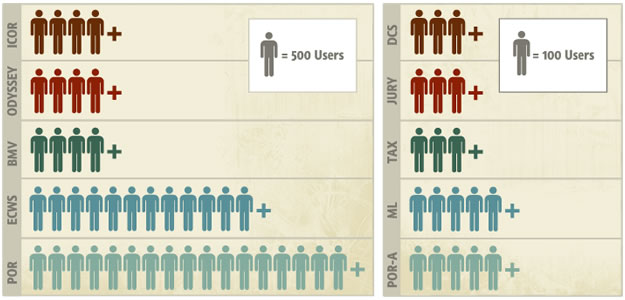The state of Indiana trial court technology ten years after JTAC’s founding and a reminder about how we got here in the first place—
 Two years into the deployment of Indiana’s uniform statewide Odyssey case management system (CMS), 51 courts in 19 counties are up and running, managing more than 22% of the state’s caseload. Now, more than 440,000 cases a year are being tracked electronically, stored in a central database, and made available to the public and other users of court data free of charge.
Two years into the deployment of Indiana’s uniform statewide Odyssey case management system (CMS), 51 courts in 19 counties are up and running, managing more than 22% of the state’s caseload. Now, more than 440,000 cases a year are being tracked electronically, stored in a central database, and made available to the public and other users of court data free of charge.
Just over a decade ago, the Indiana Supreme Court created its Judicial Technology and Automation Committee (JTAC) to develop strategies for trial court technology in our state. The implementation of case management and court information sharing are principal among its goals, so having nearly one quarter of the state’s caseload managed by the Odyssey CMS is a major milestone in what has been—and what continues to be—a challenging and necessary endeavor for justice and public safety in Indiana.
The goal of a uniform statewide CMS also makes sound fiscal policy given the long-term savings that result from centralization and uniformity. Centralization frees up local budgets from supporting software licensing, maintenance, and training costs, easing the burden on local property taxes. In addition, while the local courts need desktop computers and Internet access to use the system, they avoid the significant data center costs of localized systems; and if a county needs additional network capacity to run Odyssey, those costs are also absorbed by JTAC.
Judges and Clerks using Odyssey have noted significant advantages and they are better able to manage court cases and related financial information. This is especially evident in courts like the Marion County Traffic Court, where many infractions are processed through JTAC’s electronic Citation and Warning System (eCWS) into Odyssey, and managed electronically from the moment they are written to their disposition. Document imaging and e-filing (for other case types) are two features possible with Odyssey that JTAC has yet to offer. Both concepts are important to many courts around the state, however JTAC is committed to first ensuring the installation of Odyssey in the counties that need it before turning attention to enhanced services like e-filing and imaging.
Read a list of Odyssey project costs and assigned funding sources.
How we got here
After several years of preliminary work, research, requirements gathering, and a false start with a vendor that ultimately couldn’t meet the needs of our courts, JTAC engaged Tyler Technologies, Inc., in mid-2007 to provide Indiana’s case management system. This choice was the result of a thorough and transparent competitive procurement process that involved more than 150 stakeholders from state and local government. Tyler had implemented its Odyssey system in Minnesota and other court systems, and representatives of those courts were interviewed as part of the competitive procurement. The contract was signed in summer 2007, and before the end of the year, the system was piloted in the eight circuit courts of Monroe County and a small claims court in Marion County.
During 2009, questions like the following have been asked about the Odyssey CMS: “Why is Indiana implementing a statewide system?”; “Why not just create standards and let the counties choose?”; and “Won’t there be a tipping point when deployment costs exceed the appropriated revenue?” These are all valid questions, and they were answered by the Indiana Supreme Court prior to the formation of the Judicial Technology and Automation Committee. Back in the 1990s, the Supreme Court embarked on a project called AIMS, an effort to develop standards for individual county courts to use when acquiring case management systems. At the conclusion of this effort, which was financed by generous grants from the Indiana Criminal Justice Institute, the Court concluded the standards approach was not in the best interest of the state for several reasons:
- As a practical matter, technology never stands still long enough for standards to be useful. No sooner is a standard promulgated than some technological advancement renders it obsolete or at least in need of revision.
- The cost of acquiring a standards-compliant system would rest on local property taxpayers at a time of growing pressure on the property tax system to meet other local needs. This would leave counties with lower revenues unable to automate their case management.
- Costs and staffing associated with localized hardware, software updates, and technical support would be duplicated from county to county.
- Standards alone provide no guarantee that the locally run systems would be operated in accordance with applicable statutes, State Board of Accounts regulations, or Court rules.
- Having a substantial number of different case management systems (even today 23 different systems operate in Indiana) would make extremely difficult the exchange of court data with law enforcement, state agencies, and other users of case information. In some circumstances, it would make impossible the exchange of court data from one county to another.
In the wake of the abandonment of the standards effort, the Court established JTAC in 1999. In 2001, with the support of judges, clerks, and the executive and legislative branches, the Court began its first procurement process for a statewide system, which resulted in a contract in 2002. The vendor chosen for that contract was the only one of more than 30 applicants to propose the use of a uniform CMS that would connect local users to a central data center over broadband. (The relationship with this vendor was terminated in 2005; the vendor repaid all amounts paid to it by JTAC and paid an additional amount to be released from the contract.) By 2006, when JTAC embarked on its second procurement for a CMS vendor, all of the national vendors that applied for our contract had adopted the same approach, which validated our vision for a uniform statewide system.
Odyssey is exceeding expectations
At this stage of deployment, it is clear that a uniform system will have a positive impact on our courts.
Person-based system. With Odyssey, the basic unit for each record is not the case, but the individual. Users can easily see whether an individual has an outstanding warrant or relevant pending or decided cases in other counties.
Consistent financial tracking. A uniform system means the financial transactions entrusted to Indiana clerks are accounted for uniformly from county to county and in accordance with Indiana statutes and State Board of Accounts regulations.
Uniform case processing. Like clerk financials, the processing of cases is standardized from court to court to the extent required by state laws and Supreme Court rules, assuring similarly situated litigants are treated the same throughout the state.
Return on investment. With Odyssey, a statewide license for an unlimited number of users was paid for, up front, one time. Costs for the data center, maintenance, and support are essentially fixed, regardless of how many counties use the system. The marginal costs that do increase as counties join the system are related to network access and helpdesk staffing, but overall, those costs are small. This means that the system won’t get more expensive as it spreads throughout the state. In fact, it’s just the opposite—the marginal cost of adding courts to Odyssey are substantially less than the savings those courts realize in terminating their existing licensing, maintenance, support, data center, and other financial obligations.
The Odyssey CMS is JTAC’s biggest project, but it’s not JTAC’s only project
The need for a statewide CMS is not just illustrated by the five reasons set forth above; it’s also illustrated by the successes of the Odyssey project to date and the other centralized technology projects JTAC has implemented over the past five years. Of JTAC’s projects, Odyssey is by far the Court’s biggest and most ambitious undertaking, but it is only a part of a comprehensive effort to improve trial court technology in Indiana. To see how far we’ve come, reflect on the fact that when JTAC was established in 1999, only 30% of Indiana judges had access to the Internet and email in their courts.
In the early years, JTAC helped courts get Internet and email access, LexisNexis access, computer equipment, and desktop training. Later, an award-winning jury pool project made available comprehensive jury lists for every county across the state. Additional projects have been carried out in response to changing legislation creating a need for a statewide technology solution. And as a uniform statewide CMS began materializing, other projects have been developed that are interdependent with the concept of a uniform statewide CMS.

All of the projects undertaken by JTAC have been consistent with the committee’s three stated goals:
- Equipping every Indiana trial court with a 21st century CMS;
- Connecting individual courts’ case management systems with each other and with law enforcement, state agencies, and other users of court information, including the public; and
- Providing Indiana judges and court clerks and their staffs with additional computer resources to assist them in their work and better serve the public.
Many of the projects connecting courts with law enforcement and state agencies—such as the electronic Citation and Warning (e-ticket) System, the Protection Order Registry, and the Statewide Jury Pool—were funded primarily by federal grant dollars. Over $2,000,000 of those grant dollars were in turn delivered to counties for local technology needs, including equipment and software licensing.
Demand for immediate Odyssey installations exceeds our deployment resources—for now
Odyssey has been installed in 51 courts in the 26 months since the initial pilot installations in December, 2007. This record is all the more impressive when the rigorous quality controls demanded by the Court are considered—quality as to converting data from old case management systems, to standardizing business practices to comply with state law and regulations, and to configuring Odyssey to conform to local practices.
We are busy working on additional deployments in courts in Anderson, Fort Wayne, Indianapolis, Jeffersonville, and other places. We have a long waiting list of courts and clerks that would also like to have Odyssey installed. But with only so many men and women on our deployment teams, we are unable to fulfill these requests as rapidly as we would like. We have explored with the General Assembly temporarily increasing the court filing fee that supports JTAC’s work from $7.00 to $10.00 so as to increase the pace of Odyssey deployments. This proposal has received some support—the Indiana House of Representatives and the Senate Judiciary Committee both passed it in 2009—but it has not become law. We will install Odyssey as rapidly as our resources allow, consistent with the quality demanded by our Supreme Court.